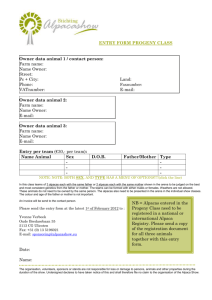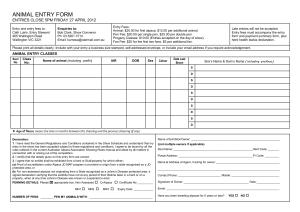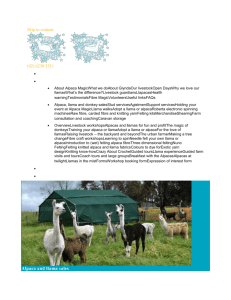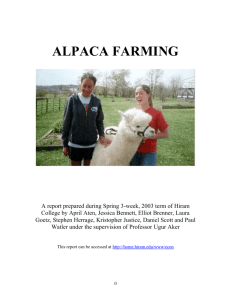news release - Alpaca Ontario
advertisement
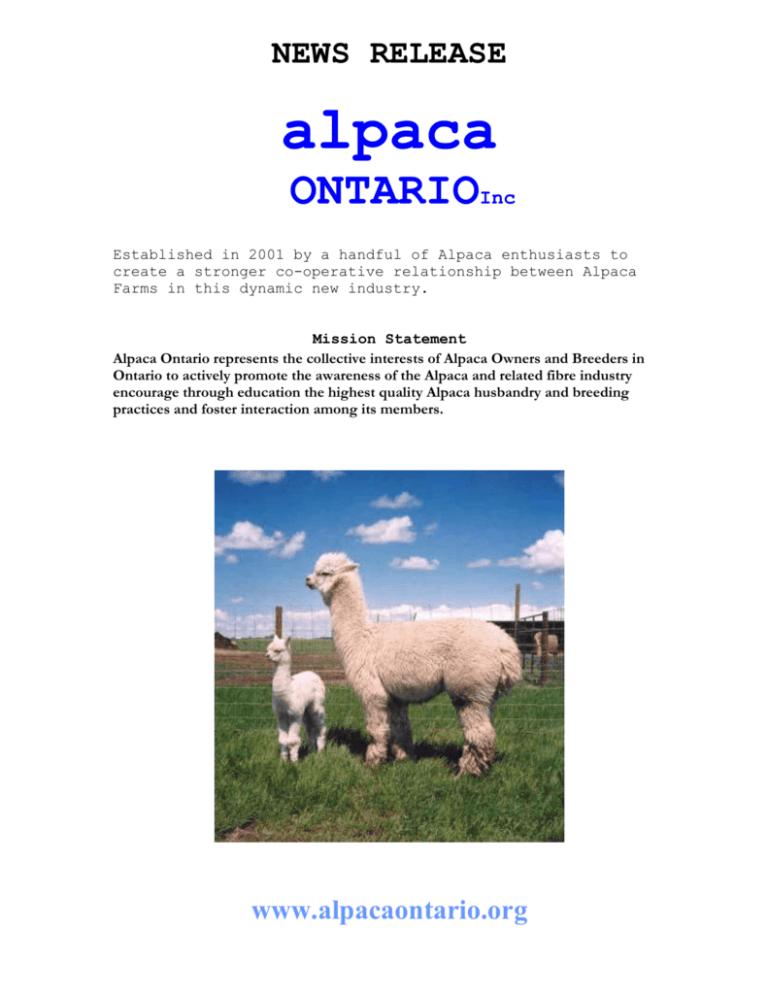
NEWS RELEASE alpaca ONTARIOInc Established in 2001 by a handful of Alpaca enthusiasts to create a stronger co-operative relationship between Alpaca Farms in this dynamic new industry. Mission Statement Alpaca Ontario represents the collective interests of Alpaca Owners and Breeders in Ontario to actively promote the awareness of the Alpaca and related fibre industry encourage through education the highest quality Alpaca husbandry and breeding practices and foster interaction among its members. www.alpacaontario.org alpaca ONTARIO In its first year of operation, run totally by volunteers, it has enjoyed an impressive launch and supportive role for its members. The first Alpaca Show in Eastern Canada held in Carp (Ottawa), with 52 Alpacas entered from 12 different farms, emphasized the quality of good breeding and the professionalism of show participation. Alpaca Ontario website, www.alpacaontario.org where all member farms are identified and links to educational sites are based. Participation in the Royal Winter Fair as an organization to co-operatively promote the Alpaca industry in Ontario. A promotional flyer for individual farms and support for the organization. A bi-annual newsletter sent to members and prospective members and posted on the website for all visitors. Committee action to include alpacas in the research pertaining to government legislation affecting the farming community in Ontario. Plans for upcoming educational seminars for the membership. www.alpacaontario.org BACKGROUNDER Alpacas Alpacas…luxurious fibre bearing animals, as valuable as pedigreed horses. The luxurious fibre bearing alpaca has found its foothold in Ontario. Alpacas are new to Ontario and were only introduced to North America within the past 15 years. The industry is growing with approximately 50 farms in Ontario, home to about 900 alpacas. An earth friendly and endearing animal native to South America, the alpaca’s arrival on the Canadian agricultural scene has meant an enjoyable lifestyle with sizable profit potential for breeders. These intelligent, fluffy, shy animals can cost between $ 5000 - 25,000 or more. Alpacas are a sizable investment, but returns on alpaca farming can be rewarding with the sale of offspring as well as products from their luxurious fleece. Alpacas produce one of the worlds finest and most sought after specialty fibres; cashmere like, and long prized in European fashion circles. International demand for alpaca fibre exceeds its supply, and Canadian alpaca farmers hope to capitalize on a growing market for this luxury fibre known for its fineness, light weight, lustre, strength, and huge range of natural colours. Raising alpacas is a viable diversification for existing farmers. However, most new participants to this alternative farming opportunity come from a variety of professional backgrounds-business people, medical doctors, teachers and lawyers. They are looking to enjoy the rural lifestyle, raise animals that are fun to look after, are raised purely for their silky fleece and not for meat, and that have the potential for a good profit. Alpaca farming is ideal for a stay-at-home parent, or for active retired people. Many people combine alpaca farming with work off the farm. Alpaca Ontario has enjoyed the participation of this broad spectrum of members working together to promote the alpaca industry in Ontario. www.alpacaontario.org History Native to the Andes region of Peru, Bolivia, and Chile in South America & domesticated for over 5,000 years Member of the Camel family (includes camels, llamas, guanacos and vicunas) First allowed into North America in the early 1980’s North American population of approx. 53, 000 animals, with about 13,500 in Canada, and approx. 900 in Ontario Temperament & Care Endearing, intelligent, curious, gentle and sociable Can be easily halter trained Weigh 100 to 180 lbs. High aesthetic appeal, ideal show animal Easy to care for and safe with children Hardy, and healthy: life span of approximately 20 yrs. Husbandry Alpacas are ruminants requiring hay and pasture 1 acre suitable pasture can sustain 5-8 animals Their padded toes are easy on the pasture Alpacas produce one offspring (cria) per year Need winter protection (barn) Need predator proof fencing Need annual shearing in spring Additional Information Females sell for $5,000 to $25,000; top quality studs can sell for more Males not suitable for studs are sold as farm pets for approximately $ 1000 Alpacas are ideal for small acreages Alpacas are insurable There are income tax advantages to raising alpacas www.alpacaontario.org Alpaca Fiber Advantages Over Wool Several times the thermal properties of wool Much stronger than wool – after mohair, alpaca is the strongest natural fibre Garments are warmer, lighter, softer, silkier & more lustrous than wool Many people who find wool prickly, can comfortably wear alpaca Naturally coloured in twenty-two shades – no dyeing required! Considered a luxury fiber worldwide and an excellent natural material for the Canadian climate Fiber Production Fiber quality is heritable and selective breeding practices enhance the desired qualities Alpacas produce five to eight pounds of fleece annually Raw alpaca fleece ranges in price, up to $50 per pound and can be sold to hand spinners after carding for up to $60 per pound. Finished yarn sells for up to $160 per pound Germany and Italy’s high fashion industry are large consumers of alpaca fleece Canadian demand is primarily through a cottage industry of spinners, weavers and knitters who produce woven or knitted products Consumer demand is expected to remain strong due to a trend towards high quality natural fibers The Canadian alpaca industry is not yet able to support large-scale commercial fiber processing due to the limited number of animals A newly formed Canadian Camelid Co-operative facilitates processing of fleece into finished products such as yarn, fabric, duvets, felt, socks and blankets. www.alpacaontario.org
